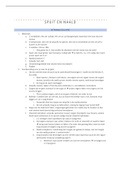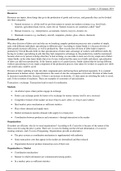Contagious Diseases Acts
Reasons the acts were introduced: Impacts of the acts: Key roles:
- Government fear of an epidemic in - Some symptoms of venereal - Committee appointed in 1862 to
the armed forces. The Crimean War diseases in women relieved with solve the problem of venereal
had high death rates due to mercury pills and ointments. diseases.
sickness and by 1864, venereal - Many women falsely accused of - Florence Nightingale (committee
diseases were responsible for 1/3 of prostitution, such as Mrs Percy, advocate) wanted the army to
sick cases. who took her own life. stop using prostitutes.
- In colonised countries such as Hong - Habeas Corpus was broken. - John Liddell (committee member)
Kong and India, cases were lower - Women with health certificates argued for the regulation of
due to registration and regulation of could charge more for their sex prostitutes.
prostitutes. work, whereas women in lock - In 1862 the committee
- Medical professionals (such as hospitals were earning nothing, recommended voluntary lock
William Acton) believed venereal increasing their poverty. hospitals for women to receive
diseases were a threat to the British - The Church supported lock treatment and penalties for men
population. hospitals as women would be in the forces who concealed
- Victorian society viewed working made to sew, read the bible etc. in venereal diseases. The
class prostitutes as being morally to order to improve morally. government rejected both
1864 Act: Reasons for repeal:
Passed without debate to give the police - In 1869 the Ladies National Association for the Repeal of the Contagious
power to arrest suspected prostitutes (in Diseases Acts (LNA) was formed.
ports and garrison towns) for medical - On the 1st January they published a petition against the acts in the Daily News
examination. Women would be detained which was signed by 124 prominent women, including Florence Nightingale,
in lock hospitals until “cured”. Josephine Butler (leader of the LNA), Mary Carpenter and Lydia Becker.
1866 Act: - Josephine Butler was chosen as the leader of the LNA as she was a mother and
married to a minister.
Introduced compulsory examinations for - Elizabeth Wolstenholme was another key figure in the LNA, believing the acts
prostitutes once every three months, to be discriminatory.
within ten miles of ports and garrison - The LNAs argument was based on morality rather than politics, as women in
towns. Victorian Britain were viewed as upholders of morality, rather than respected
as political activists.
1869 Act:
Enabled the holding of suspected
Reasons the acts were introduced: Impacts of the acts: Key roles:
- Government fear of an epidemic in - Some symptoms of venereal - Committee appointed in 1862 to
the armed forces. The Crimean War diseases in women relieved with solve the problem of venereal
had high death rates due to mercury pills and ointments. diseases.
sickness and by 1864, venereal - Many women falsely accused of - Florence Nightingale (committee
diseases were responsible for 1/3 of prostitution, such as Mrs Percy, advocate) wanted the army to
sick cases. who took her own life. stop using prostitutes.
- In colonised countries such as Hong - Habeas Corpus was broken. - John Liddell (committee member)
Kong and India, cases were lower - Women with health certificates argued for the regulation of
due to registration and regulation of could charge more for their sex prostitutes.
prostitutes. work, whereas women in lock - In 1862 the committee
- Medical professionals (such as hospitals were earning nothing, recommended voluntary lock
William Acton) believed venereal increasing their poverty. hospitals for women to receive
diseases were a threat to the British - The Church supported lock treatment and penalties for men
population. hospitals as women would be in the forces who concealed
- Victorian society viewed working made to sew, read the bible etc. in venereal diseases. The
class prostitutes as being morally to order to improve morally. government rejected both
1864 Act: Reasons for repeal:
Passed without debate to give the police - In 1869 the Ladies National Association for the Repeal of the Contagious
power to arrest suspected prostitutes (in Diseases Acts (LNA) was formed.
ports and garrison towns) for medical - On the 1st January they published a petition against the acts in the Daily News
examination. Women would be detained which was signed by 124 prominent women, including Florence Nightingale,
in lock hospitals until “cured”. Josephine Butler (leader of the LNA), Mary Carpenter and Lydia Becker.
1866 Act: - Josephine Butler was chosen as the leader of the LNA as she was a mother and
married to a minister.
Introduced compulsory examinations for - Elizabeth Wolstenholme was another key figure in the LNA, believing the acts
prostitutes once every three months, to be discriminatory.
within ten miles of ports and garrison - The LNAs argument was based on morality rather than politics, as women in
towns. Victorian Britain were viewed as upholders of morality, rather than respected
as political activists.
1869 Act:
Enabled the holding of suspected










